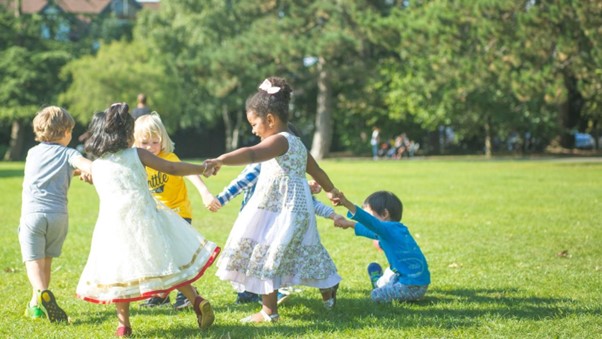Children who learn to play well with others at pre-school age tend to enjoy better mental health as they get older, research from the University of Cambridge has shown.

The findings provide the first clear evidence that ‘peer play ability’, the capacity to play successfully with other children, has a protective effect on mental health. Researchers analysed data from almost 1,700 children, collected when they were aged three and seven. Those with better peer play ability at age three consistently showed fewer signs of poor mental health four years later. They tended to have lower hyperactivity, parents and teachers reported fewer conduct and emotional problems, and they were less likely to get into fights or disagreements with other children.
Importantly, this connection generally held true even when the researchers focused on sub-groups of children who were particularly at risk of mental health problems. It also applied when they considered other risk factors for mental health – such as poverty levels, or cases in which the mother had experienced serious psychological distress during or immediately after pregnancy.
The findings suggest that giving young children who might be vulnerable to mental health issues access to well-supported opportunities to play with peers – for example, at playgroups run by early years specialists – could be a way to significantly benefit their long-term mental health.
“What matters is the quality, rather than the quantity, of peer play. Games with peers that encourage children to collaborate, for example, or activities that promote sharing, will have positive knock-on benefits.“
Vicky Yiran Zhao, a PhD Student in PEDAL and first author on the study
The researchers used data from 1,676 children in the Growing up in Australia study, which is tracking the development of children born in Australia between March 2003 and February 2004. It includes a record, provided by parents and carers, of how well the children played in different situations at age three. This covered different types of peer play, including simple games; imaginative pretend play; goal-directed activities (such as building a tower from blocks); and collaborative games like hide-and-seek.
These four peer play indicators were used to create a measure of ‘peer play ability’ – the underlying ability of a child to engage with peers in a playful way. The researchers calculated the strength of the relationship between that measure and reported symptoms of possible mental health problems – hyperactivity, and conduct, emotional and peer problems – at age seven.
The study then analysed two sub-groups of children within the overall cohort. These were children with high ‘reactivity’ (children who were very easily upset and difficult to soothe in infancy), and those with low ‘persistence’ (children who struggled to persevere when encountering a challenging task). Both these traits are linked to poor mental health outcomes.
Across the entire dataset, children with a higher peer play ability score at age three consistently showed fewer signs of mental health difficulties at age seven. For every unit increase in peer play ability at age three, children’s measured score for hyperactivity problems at age seven fell by 8.4 per cent, conduct problems by 8 per cent emotional problems by 9.8 per cent and peer problems by 14 per cent. This applied regardless of potential confounding factors such as poverty levels and maternal distress, and whether or not they had plentiful opportunities to play with siblings and parents.
The research paper is published in the Journal of Child Psychiatry and Human Development.
